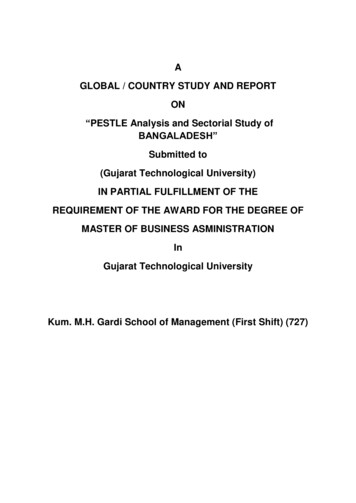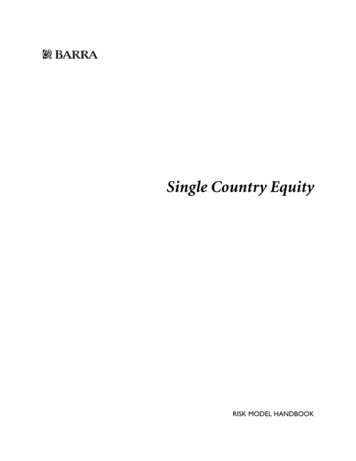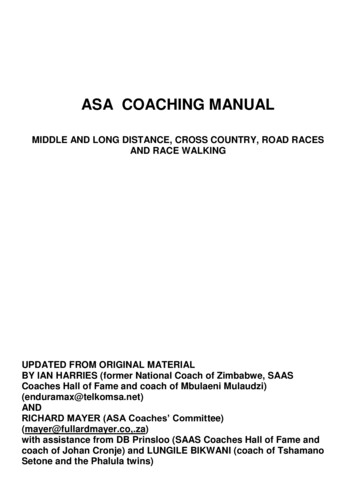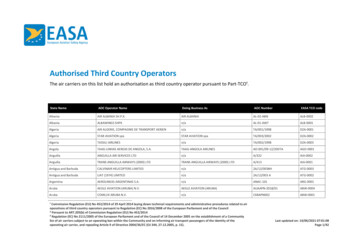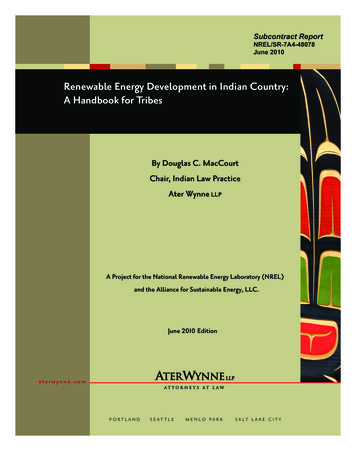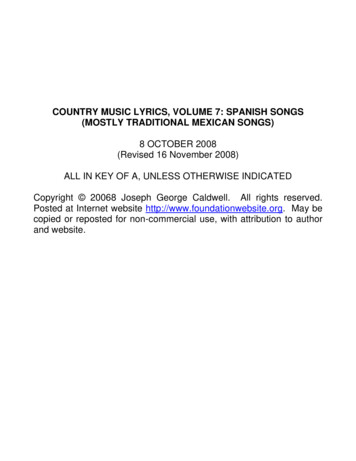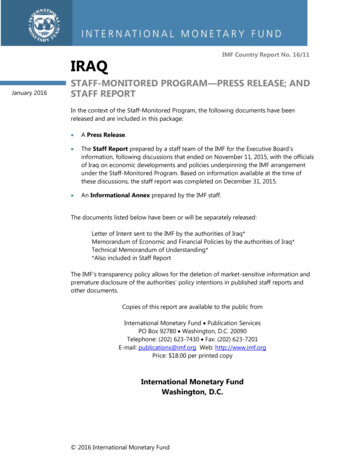
Transcription
IMF Country Report No. 16/11IRAQJanuary 2016STAFF-MONITORED PROGRAM—PRESS RELEASE; ANDSTAFF REPORTIn the context of the Staff-Monitored Program, the following documents have beenreleased and are included in this package: A Press Release. The Staff Report prepared by a staff team of the IMF for the Executive Board’sinformation, following discussions that ended on November 11, 2015, with the officialsof Iraq on economic developments and policies underpinning the IMF arrangementunder the Staff-Monitored Program. Based on information available at the time ofthese discussions, the staff report was completed on December 31, 2015. An Informational Annex prepared by the IMF staff.The documents listed below have been or will be separately released:Letter of Intent sent to the IMF by the authorities of Iraq*Memorandum of Economic and Financial Policies by the authorities of Iraq*Technical Memorandum of Understanding**Also included in Staff ReportThe IMF’s transparency policy allows for the deletion of market-sensitive information andpremature disclosure of the authorities’ policy intentions in published staff reports andother documents.Copies of this report are available to the public fromInternational Monetary Fund Publication ServicesPO Box 92780 Washington, D.C. 20090Telephone: (202) 623-7430 Fax: (202) 623-7201E-mail: publications@imf.org Web: http://www.imf.orgPrice: 18.00 per printed copyInternational Monetary FundWashington, D.C. 2016 International Monetary Fund
Press Release No. 16/04FOR IMMEDIATE RELEASEJanuary 12, 2016International Monetary FundWashington, D.C. 20431 USAIMF Managing Director Approves a Staff-Monitored Program for IraqThe Managing Director of the International Monetary Fund (IMF) approved a StaffMonitored Program (SMP) 1for Iraq covering the period of November 2015-December,2016, on which the authorities and staff had reached ad-referendum agreement in November2015 (see Press Release No. 15/509).Iraq is facing a double shock arising from ISIS attacks and the sharp drop in global oilprices. The conflict is hurting the non-oil economy through destruction of infrastructure andassets, disruptions in trade, and deterioration of investor confidence. The impact of the oilprice decline—already felt in 2014—intensified in 2015, affecting the budget, the externalsector, and medium-term growth potential. The authorities are responding to the crisis with amix of fiscal adjustment and financing.To help address the present and urgent balance of payments and budget needs triggered bythe ISIS attacks and the collapse in oil prices, the authorities have also requested an SMP toestablish a track record of policy credibility to pave the way to a possible Fund financingarrangement. Under the SMP, the authorities will implement fiscal consolidation that willcontain public expenditure in line with available revenue and financing, and aim to reducethe non-oil primary deficit by US 20 billion or 12 percent of non-oil GDP between 2013 and2016. Under the SMP, agreement has also been reached on measures to strengthen publicfinancial management, anti-money laundering and countering the financing of terrorism(AML/CFT), and financial sector stability.The IMF has assisted Iraq in strengthening economic institutions and in providing advice tothe government on economic policies and reforms for more than a decade. IMF staff willwork closely with the authorities to monitor progress in the implementation of theireconomic program. In addition, the IMF will continue to provide technical assistance tosupport Iraq’s capacity-building efforts and its reform program.1An SMP is an informal agreement between country authorities and Fund staff to monitor the implementationof the authorities’ economic program. SMPs do not entail financial assistance or endorsement by the IMFExecutive Board.
IRAQSTAFF-MONITORED PROGRAMDecember 31, 2015KEY ISSUESContext: Iraq is facing a double shock arising from the ISIS attacks and the sharp drop inglobal oil prices. The conflict is hurting the non-oil economy through destruction ofinfrastructure and assets, disruptions in trade, and deterioration of investor confidence. Theimpact of the oil price decline—already felt in 2014—has fully unfolded in 2015, affectingthe budget, the external sector, and medium-term growth potential. The authorities areresponding to the crisis with a mix of fiscal adjustment and financing, maintaining theircommitment to the exchange rate peg.Staff-Monitored Program: To help address the present and urgent balance of paymentsand budget needs triggered by the ISIS attacks and the collapse in oil prices, the authoritieshave requested a Staff-Monitored Program (SMP) to establish a track record of policycredibility to pave the way to a possible Fund financing arrangement.Outlook and Risks: Assuming a resolution of the conflict in the coming years and a pickupin oil production together with the envisaged modest recovery in oil prices, the baselinemedium-term outlook still looks positive. Under improved security conditions, themacroeconomic scenario would continue to be driven by the expansion in oil revenue,assuming implementation of oil investment to increase oil production, and by fiscaladjustment. But risks remain very high, arising primarily from a further fall in oil prices,worsening of the conflict, political tensions, or poor policy implementation.Key Policy Recommendations: In 2015-16, strong fiscal consolidation is needed to address the fall in oil revenues andcontain central bank financing of the budget and associated losses in foreign exchangereserves. The exchange rate peg remains appropriate, provided that the authorities implementthe fiscal consolidation programmed under the SMP. Public Financial Management needs to be overhauled in order to improve the qualityof spending and the authorities’ control over budget execution. Banking supervision needs to be strengthened in order to monitor and contain thedamage inflicted by the crisis on the banking system.
IRAQApproved ByAasim M. Husain andTaline KoranchelianDiscussions took place in Amman during October 27—November 11,2015. Staff representatives comprised Christian Josz (head), Ritu Basu,Amgad Hegazy (all MCD), Christiane Kneer (SPR) and Marwa Al Nasaa(Resident Representative). Maya Choueiri (Senior Advisor, OED) joinedthe mission. Representatives from the World Bank, the JapaneseInternational Cooperation Agency and the U.S. Embassy in Baghdadattended the meetings at the authorities’ request. Norma Cayo andYi Liu assisted in the preparation of the report.CONTENTSBACKGROUND: IRAQ IS FACING AN ACUTE FISCAL AND BALANCE OF PAYMENTS CRISIS 4A. Background 4B. Recent Economic Developments 6C. Outlook 7ECONOMIC POLICIES TO ADDRESS THE CRISIS 8A. Implementing a Large Fiscal Consolidation 8B. Managing External Pressures 11C. Strengthening Public Financial Management 12D. Monitoring Financial Risks 13PROGRAM MODALITIES AND RISKS 14STAFF APPRAISAL 15FIGURE1. Recent Economic Developments and Outlook, 2013-20 5TABLES1. Selected Economic and Financial Indicators, 2013–20 172. Central Government Fiscal Accounts, 2013–20, in trillions of ID 183. Central Government Fiscal Accounts, 2013–20, in percent of GDP 194. Central Government Fiscal Accounts, 2013–20, in percent of non-oil GDP 205. Balance of Payments, 2013–20 216. Monetary Survey, 2013–16 227. Central Bank Balance Sheet, 2013–16 238: Selected Banking Indicators, 2011–15 242INTERNATIONAL MONETARY FUND
IRAQAPPENDIXI. Letter of Intent 25Attachment I. Memorandum on Economic and Financial Policies 27Attachment II. Technical Memorandum of Understanding 42INTERNATIONAL MONETARY FUND3
IRAQBACKGROUND: IRAQ IS FACING AN ACUTE FISCALAND BALANCE OF PAYMENTS CRISIS1.The economy has been hit hard by the collapse in oil prices and the ISIS attacks. Theexternal environment has worsened since the latest Article IV consultation1 mainly owing to furtherweakening of global oil prices. The ongoing armed conflict with ISIS continues to strain thecountry’s resources and is resulting in new waves of internally displaced people.A. Background2.Iraqi forces are making progress in retaking territories controlled by ISIS. In October,Iraqi forces and their allies recaptured most of the country’s largest oil refinery in Baiji, a strategiccity between Baghdad and Mosul. In November, Kurdish forces took control of towns and sectionsof highway around Sinjar, between Mosul and the border with Syria. In December, the Iraqi forcesand their allies launched a major offensive to retake control of Ramadi, west of Baghdad.3.The ISIS attacks has boosted the number of internally displaced persons—estimatedat 4 million people at end-June 2015 (Memorandum of Economic and Financial Policies—MEFP,¶3). Close to 10 million Iraqis (almost one third of the population) including 250,000 Syrian refugeesneed humanitarian assistance.4.In response to escalating protests across the country fueled by massive electricityoutages, Prime Minister Abadi proposed a series of significant administrative reforms inAugust (MEFP, ¶4). Parliament approved a number of these measures, including reducing thecabinet from 33 to 22 members, eliminating three vice-president and three deputy prime ministerpositions, addressing tax evasion, implementing customs at border points including within KRG,reducing security budgets and lowering pension ceilings and salaries for some officials.Nonetheless, Iraqis have continued to protest against the lack of progress to implement thesemeasures to date and demanded decisive steps to address widespread corruption, inefficiency, andlow quality of government services.1IMF Country Report No. 15/235. Iraq: 2015 Article IV Consultation and Request for Purchase under the RapidFinancing Instrument-Staff Report.4INTERNATIONAL MONETARY FUND
IRAQFigure 1. Iraq: Recent Economic Developments and Outlook, 2013-20The balance of payments has weakened, leading to a drawdown of foreignexchange reserves, but is expected to strengthen in sync with oil revenue.Oil prices and exports have dropped sharply but are expected togradually recover.120Oil Price and RevenueExport revenue (in billion US , RHS)APSP oil price (in US /barrel)1001201510010805100External Balance(In percent of GDP, unless otherwise indicated)Financial accountCurrent accountOverall balanceStock of reserves (in billion US , 62017201820192020350-20Fiscal Consolidation(In trillions of Iraqi dinars, unless otherwise indicated)Oil revenueNon-oil revenueCurrent expenditure: oilCurrent expenditure: non-oilCapital expenditure: oilCapital expenditure: non-oilOverall balanceAdjusted non-oil primary balance (in percent of non-oil GDP, RHS)30025020015010050402013In reaction to the fall in oil revenue, the authorities have implemented a largefiscal consolidation involving mostly cuts in non-oil investment and goods he budget deficit is mostly financed by indirect monetary financingleading to a sharp but temporary increase in public debt.20016080Debt Burden(In trillions of Iraqi dinars, unless otherwise indicated)Foreign debtDomestic debtDebt-to-GDP ratio (in percent; 7201820192020Sources: Iraqi authorities and IMF staff calculations.INTERNATIONAL MONETARY FUND5
IRAQB. Recent Economic Developments5.Oil production, located in areas under control of the Iraqi government and the KRG, isholding well. For the first 11 months of 2015, it increased by 14 percent and oil exports increasedby 23 percent year-on-year. Northern oil exports accelerated in line with the oil revenue sharingagreement between the federal government and the Kurdistan Regional Government (KRG) untilJune, when the KRG, dissatisfied with the size of the federal transfers, drastically reduced oil supplyto the State Oil Marketing Organization (SOMO) and increased its independent sales to finance itsexpenditure.2 In November, oil production and exports reached all time highs of, respectively,4.2 and 4 million barrels per day (mbpd). Exports by the federal government reached 3.4 mbpd andKRG exports 0.6 mbpd.6.Non-oil activity in the part of the country that is not occupied by ISIS dropped by8 percent year-on-year during the first semester of 2015. The fall was particularly high inconstruction (-64 percent), manufacturing (-20 percent) and business services (-57 percent). Thegovernment has no information on economic activity in the ISIS-controlled territories.7.At end-October 2015, y-o-y consumer price inflation (CPI) was low at 1.6 percent, butis likely underestimated because CPI coverage excludes areas occupie
Iraqi forces are making progress in retaking territories controlled by ISIS. In October, Iraqi forces and their allies recaptured most of the country’s largest oil refinery in Baiji, a strategic city between Baghdad and Mosul. In November, Kurdish forces took control of towns and sections



